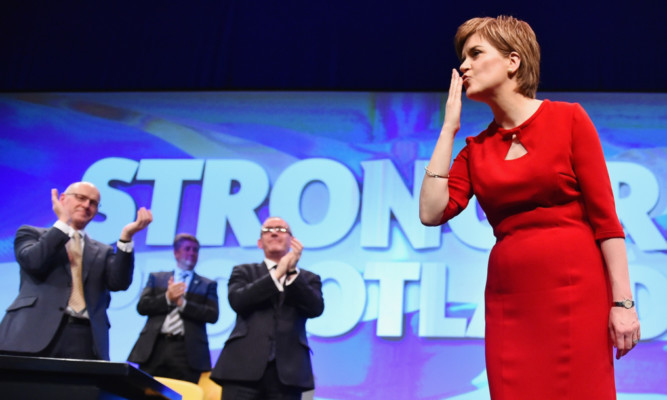The triumphant tone of Nicola Sturgeon as she closed her party conference drew the anticipated adoration of the crowd.
Addressing the SNP’s biggest gathering yet but talking to all Scots, she urged voters to put their trust in her because she knows what is best for them and because “the choice at any election is about more than policies”.
This early starting gun for the May 2016 Holyrood election campaign signals a presidential-style approach by the Nationalists; it also suggests power has rather gone to Sturgeon’s head.
This is understandable in some ways. Since her side lost the independence referendum last September, she has had an uninterrupted winning streak.
Love fest
First, she was elected unopposed as the successor to Alex Salmond. Then she toured the country on a victory lap which culminated in a rock concert-type love fest at Glasgow’s Hydro in front of 12,000 fans.
With her leadership transformed into a personality cult, she went on to outperform all other party leaders in televised debates and by the time the nation went to the polls in May’s general election, she was ready to annihilate the opposition in Scotland.
She now trades on the fact she is the SNP’s greatest asset because that has worked so well for her so far and because it’s true. The party has little else to show for its eight years in government.
How convenient it would be for the Nationalists if the electorate did what it was told, put its blind faith in Sturgeon and asked no awkward questions about the delivery of public services and the spending of the public’s taxes.
If only ministers did not have to explain what they planned to do and indeed what they have done to date, in areas such as health, education, policing, transport, housing, energy, justice and so on and on.
However, we are not all gullible and unstoppable as the SNP currently seems, Scotland is not yet a one-party state.
In fact, there is still a majority who disagree with the Nationalists on the single policy that matters to them, secession and they will not be won over without a fight.
If Sturgeon and her team were on top of their arguments, confident about their achievements in office and clear about their plans for a third term, they would be eager to discuss policies.
However, the perpetual focus on constitutional change since they came to power has been a useful cover for a lack of ideas elsewhere and a resulting record of endless disappointments.
Urgent issues
Not only have NHS targets been missed, education standards plummeted and the centralisation of the police descended into farce but unemployment in Scotland is rising alarmingly, while it is falling in England.
With even more control being handed to Holyrood by Westminster last week it was abortion law the SNP’s ploy of blaming London for its shortcomings is wearing thin with all but its most supine supporters.
And that brings us to another potential pitfall for the party: its own members.
Until very recently, the Nationalists could count on the kowtowing of the rank and file but Aberdeen produced a novel spectacle.
The thousands of new devotees who joined the party in the wake of the Yes campaign include a bunch of activists who could be very bad news for Sturgeon.
Ambush
She thought the issue of a second referendum would plague the conference but she put together a fudge and averted a rebellion, temporarily at least. She was ambushed, instead, on land reform, when members told ministers to come up with more radical measures.
One delegate said the ancestors of Scotland’s lairds, dating back to medieval times, had stolen the land and anyone who had bought it in the intervening years was guilty of handling stolen goods.
The state, he said, as the people cheered, could buy back this land using a new currency called the Scottish Land Pound, which presumably would grow on trees in an independent Scotland.
The government’s bill, which could see landowners stripped of their property, was denounced as too timid and will now have to be beefed up to comply with members’ demands.
Then there were the hardcore who attempted, unsuccessfully in the end, to tighten the SNP’s moratorium on fracking to an outright ban. Already denounced for its anti-science agenda, the party is being pushed back into the dark ages by a shouty mob of its own making.
Any more of this and ordinary voters will take fright. Having strived to convince us that it is competent at governing and in command of its fringe troops, the SNP appears to be losing its grip on both.
No wonder Sturgeon is desperate to keep the country’s attention on her in the countdown to May and not on the problems mounting up in her party.
